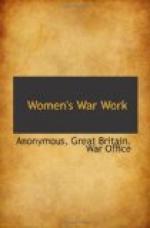The recommendations of the Speakers’ Conference were an agreed compromise, and the Representation of the People Bill, as it was called on its introduction, has gone through very much on the lines of the recommendations. It arranges for postal or proxy votes for the soldier, the sailor and the merchant seaman, it simplifies the qualifications for men, it retains the University vote for men and extends it to women, and it enfranchises women of thirty years of age on a residence qualification, and all wives of voters of the same age. It disfranchises, for the time, the conscientious objector who will do no national service. The age at which our men vote is twenty-one. The higher age of the women was a compromise, which was accepted by all women’s societies and by labour women, though it was not the terms they stood for—equality.
If we had it on the same terms as men, we should very greatly outnumber the men. There were over a million more women than men before the war and a new electorate greater than all the men’s numbers brought in at once was not considered wise. To press for it would have wrecked our chances.
This measure enfranchises six million women, and about ten million men are now voters, so we have a very fair proportion.
The women’s clause was carried, with only thirty-five dissentients and later only seventeen voted against it.
In this same bill, with practically no discussion, an amendment was carried enfranchising the wives of local government electors.
It is difficult to adequately express the confidence, the desire, and the willingness to co-operate, that there is now between our men and women.
We know, too, that the great woman’s movement of our country, which has worked to this end for fifty years and numbered our greatest women among its adherents, has had much to do with the ability of our women to take the great part they have in this crisis. If women had not toiled and opened education and opportunities to women, and preached the necessity of full service, we could not have done it.
One great thing the war has done for our women is to draw us all closely together—in common sorrows, hopes and fears, we find how much we are one and in so much of our work women of every rank of life are together. We had that union before in many ways, but never so completely as now. Punch has a delightful picture that summed up how we are mixed in soldier’s canteens, and huts and buffets, and Hospitals, which show a little Londoner saying to a meek member of the aristocracy “washing up,” “Nar, then, Lady Halexandra, ’urry up with them plaites,” and we have an amusing little play of the same kind. The society girl who washes down the Hospital steps, and washes up for hours, and carries meals up and down stairs in her work, week after week, and month after month, and year after year, in our Hospitals, knows what work is now, and the soldier who is served, and the soldier’s sister and wife, learns something, too, about her that is worth learning.




